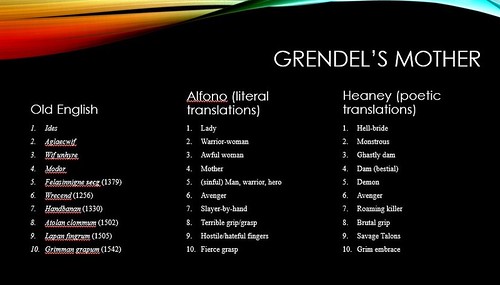
Title: [Beowulf]
Author: Trans. Seamus Heaney
Genre: Anglo-Saxon Poetry
Medium: Paperback
Acquisition: Teaching Text
Date Completed: April 14, 2016
Rating: *****
This semester I had a few students who objected to my use of the term "cannibalism" to describe Grendel's transgressions, and my admittedly tongue-in-cheek description of Beowulf's fight with the infamous man-eater. After a day of interesting debate I used our disagreement as an opportunity to more explicitly discuss the problems of translation, as we had briefly addressed in our readings of Sappho and Dante. In my writing on Grendel's mother for a conference in 2014 I came upon an article by Christine Alfono, who directly addresses the inherent bias in Anglo-Saxon translation, specifically as it relates to Grendel's mother and her characterization in the translated poem. As an illustration, I shared with my student's Alfono's offering of five different translations - and their connotations - from the same Anglo-Saxon line, and I further complied a list of ten terms named by Alfono, what she asserts are "literal" translations of the words (a few I confirmed online, for my own curiosity), and Heaney's word choices.

Though I will agree to disagree with my students on our initial difference of understanding, the lecture served its purpose, and we had another lively discussion about why some translations may make sense, and how others belie the cultural prejudices named by Alfono in her own scholarship.
It's been an odd semester, engaged in two separate independent studies. Left to my own devices for one, I found myself reading most of each week's novel before rushing off to the next at the rather frenzied pace I had set for myself. Now I'm finding the time to get to the last few chapters of each as I prepare to write about them all. My reviews here are brief, because I am reserving more specific thoughts and readings for the essay I am preparing.
30.

Title: [Lady Audley's Secret]
Author: Elizabeth Braddon
Genre: Victorian Sensational FIction
Medium: Broadview Paperback
Acquisition: IS Primary Source
Date Completed: April 17, 2016
Rating: *****
Elizabeth Bradden's sensational 1862 novel was, according to the Broadview edition, "one of the most widely read novels in the Victorian period," and it's certainly clear why. Full of mystery, blackmail, bigamy, and other foul crimes, the text navigates social and gendered spheres with a rapidity that leaves the reader's head spinning with excitement as she follows the lay-about nephew of Sir Audley as he seeks out the truth of his friend's disappearance, and the secrets kept by his childish, doll-like aunt, Lady Audley. The novel exchanges on the Victorian love of mystery and armchair detection, and offers a series of puzzles sure to delight original and contemporary readers.
The back of the Broadview edition further asserts that the novel "creates significant sympathy for the heroine, despite her criminal acts, as she suffers from the injustices of the 'marriage market' and rebels against them." My own reading contradicts this analysis, at least in the first. On the contrary, I found Lady Audley to be repugnant. Early in her life Lady Audley is treated very poorly, and her personal narrative seeks to emphasize the injustices of the gendered systems of nineteenth-century England. She is legitimately a victim a this point, and all sympathy belongs to her, blame falling squarely on the shoulders of he who mistreats her. However, her true character is revealed in how she seeks to improve her conditions, ultimately dissuading the reader from the sympathy Broadview suggests. There is a line of desperation and innocence Bradden could have maintained in order to shift blame and sympathy, but she crosses this. The final explanations serve as a convenient and absurd excuse by a conniving criminal, and the triviality of her actions keep her from becoming even an engaging villain. I am disappointed in Lady Audley, who I was very prepared to adore for her passionate grasping of autonomy and assertion of self, but I found her wanting.
As a whole, I thoroughly enjoyed the book, and found much to write about - so much, in fact, that my difficulty is now in limiting my options.
31.

Title: [North and South]
Author: Elizabeth Gaskell
Genre: Victorian FIction
Medium: Penguin Paperback
Acquisition: IS Primary Source
Date Completed: April 17, 2016
Rating: ***
For all my disappointment in Lady Audley, however, she remains far more engaging and interesting as a character than Margaret Hale, of Elizabeth Gaskell's 1855 North and South. Upon the marriage of her cousin, Margaret Hale leaves the London house of her aunt, where she had been residing, to return to the utopia of her childhood home, of which she waxes eloquently to all who will hear for much of the early portions of the novel. Unfortunately, this peace is broken by her father's crisis of conscience, and when he gives up his parish post he moves Margaret and her mother with him to a Northern industrial city, where they are forced to take dingy accommodations, breathe polluted air, and lament the lack of society in the city where Mr. Hale has elected to become a private tutor. North and South ruminates on the deplorable living and working conditions of the lower-class employees of mills, as Margaret Hale tries to find her own place in Milton. While the social commentary is thoughtful, and provides a useful perspective in understanding the use and function of the Victorian novel in the popular understanding of such divides and social reform, I could not maintain interest in the protagonist, who is ultimately too perfect to be compelling. I personally prefer characters with texture - or perhaps deviance -but even her transgressions are perfectly situated to emphasize her goodness and adherence to the expectations of proper nineteenth-century middle-class women. Ultimately I was fairly horrified by the connotations of the conclusion of the romantic plot, which I assert promises only misery for Margaret.
No comments:
Post a Comment